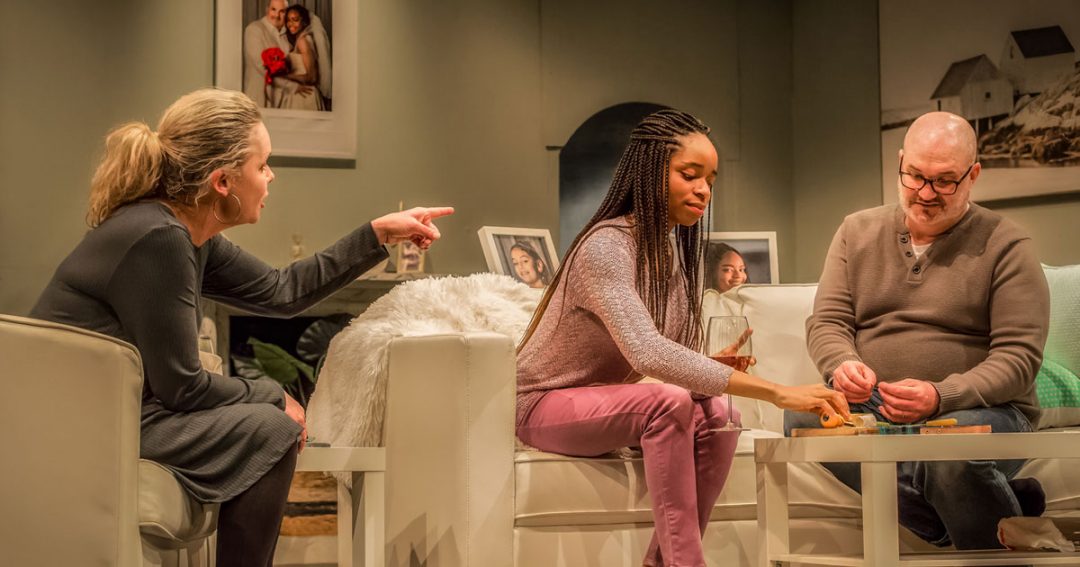Do you consider yourself “good people”?
That really is the underlying theme and question of this latest production by the Adelaide Repertory Theatre of David Lindsay-Abaire’s Good People.
Set in Boston, the play centres on the character of Margaret (Rachel Burfield), a middle-aged mum of an adult daughter with special needs, who has grown up in the “Southie” neighbourhood and whose life seems to always miss out on luck.
When we first meet Margaret, the young manager of the dollar store where she works, Stevie (Curtis Shipley), is firing her for being constantly late. What follows, is her desperate effort to find work, ultimately leading her to seek out an old school chum who’s made it good by becoming a doctor, Mike (Nicholas Bishop). Mike has no work available but through a prolonged and testing discussion, Margaret invites herself to a party being thrown for Mike by his wife, Kate (Rhoda Sylvester), in the hope that one of the other guests might have work on offer.
This is a beautifully written play, with a dense storyline and a cast of characters with depth and complexity.
For empathic audience members, it’s easy to be drawn to Margaret because we want to see her finally get a break but even while our hearts are leaning towards her, we see her “dark” side. In her first conversation with Stevie, she at first adopts a flattering tone with him and then when she senses that won’t save her job, she quickly changes tack and tries some emotional blackmail, some passive aggressive tactics, and even a veiled threat.
This pattern is then repeated in her first and second encounters with Dr Mike. It is breathtaking to watch her work through a palette of emotions and dispositions to try to arrive at her goal. What’s also intriguing is how her streetwise nature and her understanding that the stakes are life and death (or, at least, hunger and homelessness vs food and lodgings) means she is unencumbered in her methods. Whereas, Dr Mike is “higher up” the social ladder so in his reunion with Margaret, he undergoes a fascinating struggle as Margaret’s barbs and challenges undulate from subtle to candid, and from hint to accusation. Her gnawing at his aloof exterior starts fraying the threads of the coat of polite etiquette that he fidgets with and clings to in a vain attempt to keep his long-dormant “Southie” self obscured.
The chemistry between these two characters is artfully brought to life by the players. Bishop masterfully conveys Mike’s reluctant return to the ghosts and passions of his upbringing (and his schoolboy relationship with Margaret), while Burfield delivers a tour-de-force performance as the broken, conniving, caring, “good” person who is battling to survive. These two actors shine and Nick Fagan’s direction has modulated the pace and emotion with great care. There are many quiet passages in this production, and the Burfield/Bishop scenes sizzle at a slow, smouldering burn, punctuated by bursts of passion and surprise, and often drawing deep rounds of guffaws and gasps from the audience.
This is indeed a play for thoughtful theatre goers and it rewards those who are patient for a long night of realism. It’s tempting to opine there’d be little lost if the red pen trimmed the first bingo scene and excised the second completely, but there’s something gritty about the way this play slowly steps through its arc and Lindsay-Abaire’s thorough tying up of loose ends is quite possibly as satisfying as it is, due to banality of bingo hall communion.
Curtis Shipley has an intriguing stage presence in this production, very unassuming and earnest and a pleasure to watch. Lyn Crowther and Cate Rogers, who play Margaret’s landlady and friend, respectively, are wonderfully acerbic in parts and give us authentic performances. Rhoda Sylvester, who plays Mike’s wife, Kate, has a great challenge of appearing for the first time in act two and needing to establish herself in what is already a thicket-like story. Her reactions, as Margaret reveals parts of Mike’s past, are astutely played, acting as a troubling barometer revealing the growing pressure in her marriage.
Brittany Daw has proven to be very resourceful with her set design. A three-part stage for act one, and a full stage transformation in act two, created a worthy space in which this drama could unfold. The technical and stage crews also performed superbly well, and deserve to be honorary “good people” for making another night of theatre happen with aplomb.
Good People delivers plenty of deep, rewarding laughs but its true value is in the microscopic investigation it renders, into the small moments in life that have big consequences. It also poses much food for reflection in relation to how much luck plays a part in all our lives. It asks to honestly interrogate our pasts and give credit where it’s due to help we’ve received, while asking us to humbly admit to mistakes and mis-steps. Ultimately, as Margaret notes, this play reminds us that most people struggle; struggling is a normal state of affairs for many of us. What we do about that, what stories we tell about that, well, that might well determine whether or not we are “good people”.
Good People is a night of satisfying, thoughtful theatre, but be prepared to work hard to earn the pay off.

